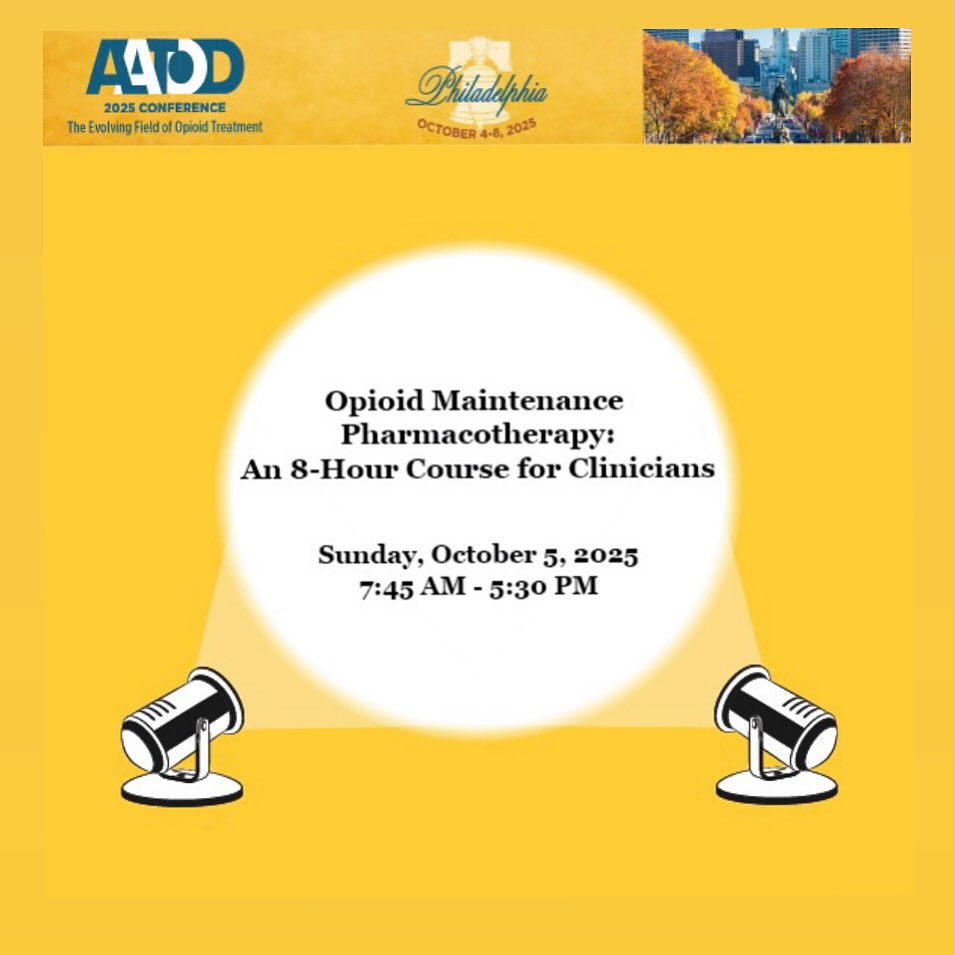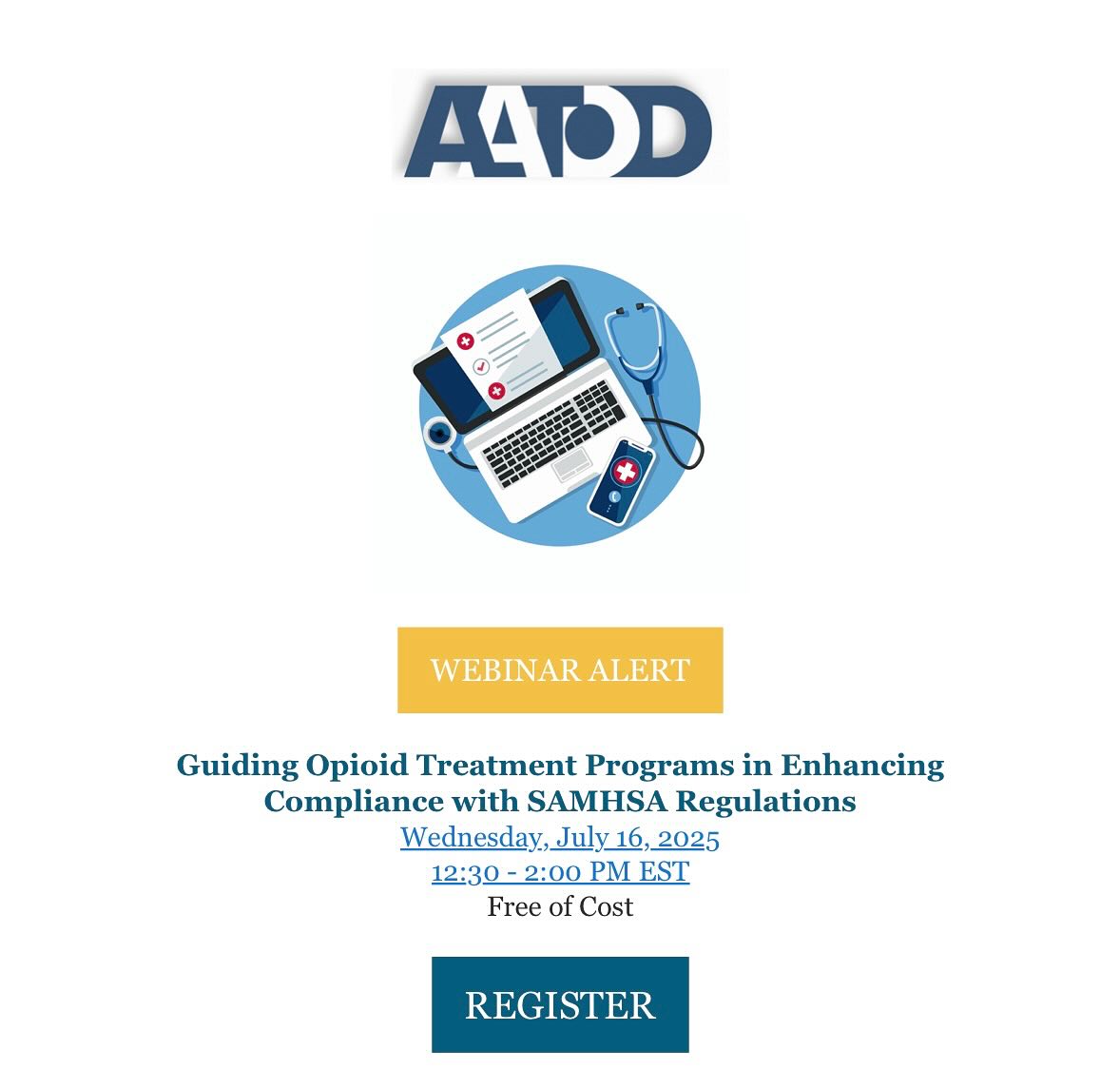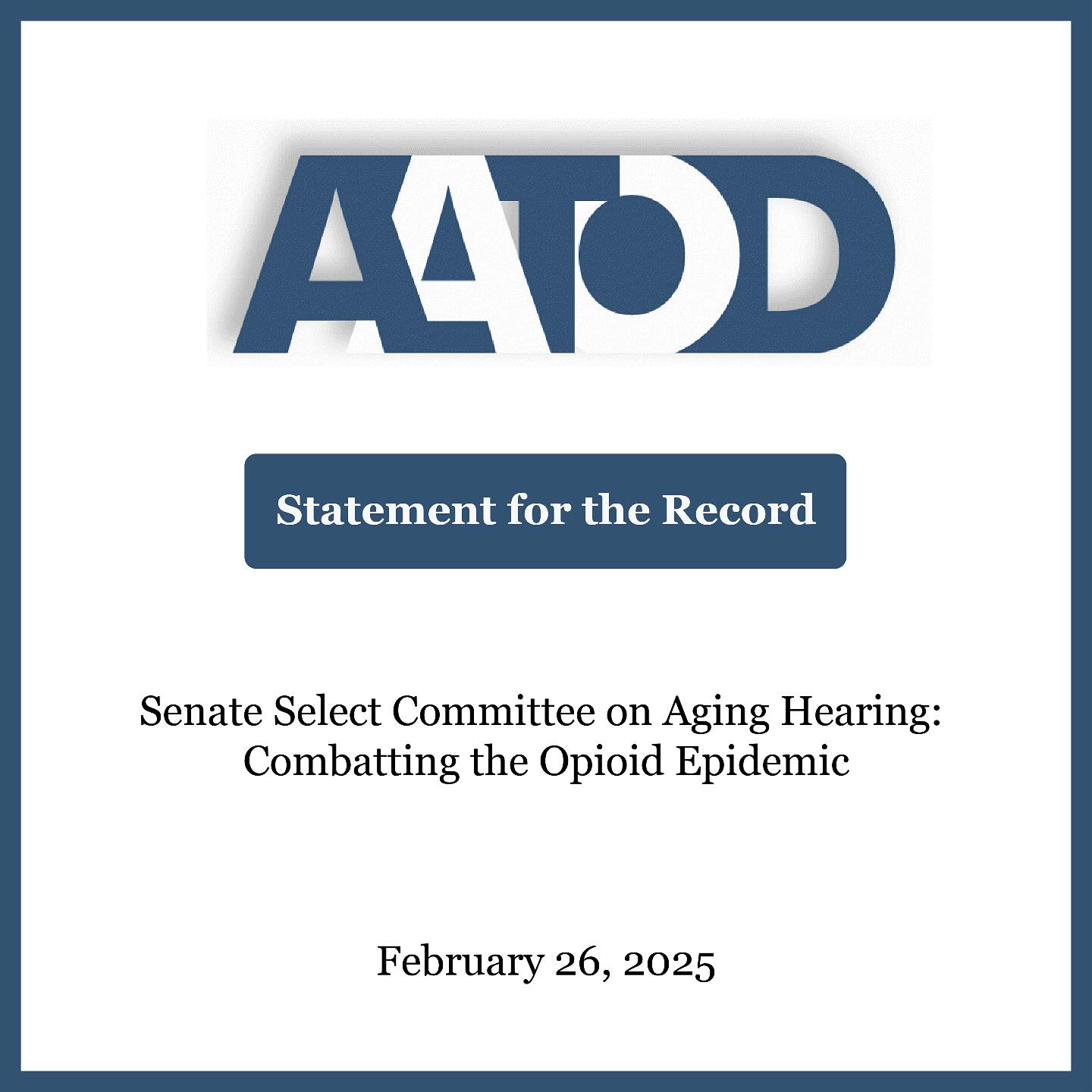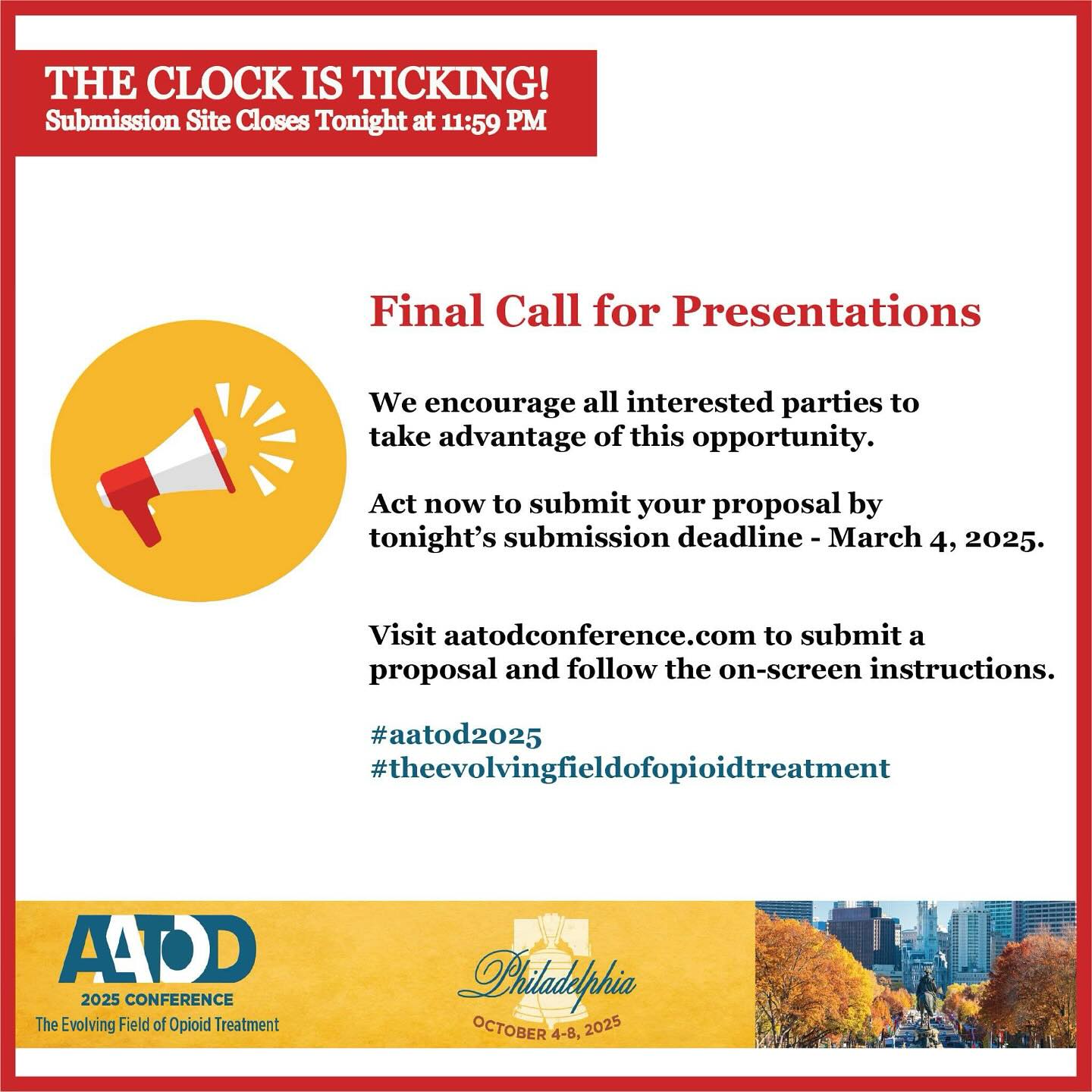1984
AATOD was founded as the Northeast Regional Methadone Treatment Coalition at the Inaugural Regional Conference in New York City
1989
The Northeast Regional Methadone Treatment Coalition evolved into the American Methadone Treatment Association (AMTA).
Our European colleagues (forerunner of EUROPAD) present the first major international symposium at our Association’s last Northeast Regional conference in Newport, Rhode Island.
1991
The inaugural national conference convenes in Boston, as states outside of the Northeastern corridor begin to join the American Methadone Treatment Association (AMTA) as new member state chapters.
1993
AMTA works in conjunction with members of the American Society of Addiction Medicine to develop the content for SAMHSA’s TIP #1, “State Methadone Treatment Guidelines”, which was published and released through SAMHSA. These were the first clinical guidelines in a comprehensive form written for the field since the initial use of methadone in OTPs.
1995
AMTA opens its full time office in New York City.
2000
AMTA works in conjunction with the DEA and a number of other parties including SAMHSA, to develop the Narcotic Treatment Programs Best Practice Guidelines, which is released at AMTA’s conference in San Francisco in April 2000.
2001
The AMTA Board approves the change in the name of the Association to the American Association for the Treatment of Opioid Dependence (AATOD), reflecting the new medications that are being developed to treat opioid dependence.
2002
AATOD works with the National Association of Drug Court Professionals to develop the first Fact Sheet with regard to methadone and buprenorphine use to treat chronic opioid addiction.
2003
ATOD utilized a Robert Wood Johnson Foundation Innovators Award with a matching grant from Mallinckrodt, Inc, to provide access to medication assisted treatment through the criminal justice system.
Pilot tested an innovative Hepatitis C training initiative for OTP staff with SAMHSA/CSAT funds. This lead to a long term multi-year training process including the nation’s treatment system.
2005
Develop a strategic initiative with EUROPAD (European counterpart to AATOD representing 21 nations) to provide access to medication assisted treatment throughout the world with the focus on the Russian Federation.
AATOD works in conjunction with its research partner (NDRI) in working under the auspices of the RADARS™ System, collecting data from 75 OTPs in over 30 states, evaluating changing patterns of opioid use and abuse. This is initially funded through Purdue Pharma and currently funded by the Denver Health and Hospital Authority. This is part of the mosaic of data collection systems which are managed under the aegis of the Denver Health and Hospital Authority.
AATOD worked with a number of policy stakeholders to develop TIP 43 for SAMHSA “Medication Assisted Treatment for Opioid Addiction in Opioid Treatment Programs”. This is still a benchmark reference in guiding the clinical development of how OTPs should treat patients.
2006
After months of planning, the AATOD office relocated to 225 Varick Street in New York on December 13, 2006 to be co-located with the Legal Action Center.
2007
AATOD works in conjunction with its European partners (EUROPAD) in executing the charter for the World Federation for the Treatment of Opioid Dependence, which is formalized in Ljubljana, Slovenia.
2010
Work with representatives at the National Development and Research Institute (NDRI) and Brown University in developing attitudinal surveys to understand the views of representatives in the criminal justice community in using approved medications to treat chronic opioid addiction.
2011
The World Federation for the Treatment of Opioid Dependence receives Special Consultative Status through the United Nations Economic and Social Counsel.
2012
AATOD works in conjunction with EUROPAD and the World Federation for the Treatment of Opioid Dependence in developing a conference with the government of the Ukraine, “Ukrainian Society and Drugs: Building a New Strategic Approach”.
2014/2015
AATOD worked with 15 OTPs, developing a similar quarterly survey instrument reporting on the success in treating patients more effectively as OTPs check PDMP databases throughout the patient’s care. The study follows 15 programs for a one year period and the data will be reported out in 2016.
2015
AATOD produced three policy papers for SAMHSA, focusing on models of service integration between OTPs and primary and behavioral healthcare settings. One of the papers discussed models of engaging drug courts, child protective services, family courts, and correctional settings in creating linkages between OTPs and such individuals within each of these populations. Another paper focuses on the Vermont Hub & Spoke Model and the models of Health Homes and OTPs in Rhode Island and Maryland.
AATOD produced four webinars for SAMHSA in conjunction with the American Institutes of Research, encouraging all OTPs to utilize the four SAMHSA Extranet websites in submitting patient exception requests, which also need to be approved by the State Opioid Treatment Authorities (SOTAs).
Work with the American Academy of Addiction Psychiatry through a PCSS mini grant as funded by SAMHSA to develop a model of service integration between OTPs and DATA 2000 practices. This project was based on the model as developed by Dr. Kenneth Stoller and his associates at Johns Hopkins. It presently includes a number of OTPs and provides the necessary tools in how such OTPs can work with DATA 2000 practices in promulgating interfacility referrals.
AATOD developed three policy papers for SAMHSA, focusing on models of service integration between OTPs and primary and behavioral healthcare settings. One of the papers discussed models of engaging drug courts, child protective services, family courts, and correctional settings in creating linkages between OTPs and such individuals within each of these populations. Another paper focuses on the Vermont Hub & Spoke Model and the models of Health Homes and OTPs in Rhode Island and Maryland.
AATOD produced four webinars for SAMHSA in conjunction with the American Institutes of Research, encouraging all OTPs to utilize the four SAMHSA Extranet websites in submitting patient exception requests, which also need to be approved by the State Opioid Treatment Authorities (SOTAs).
Work with the American Academy of Addiction Psychiatry through a PCSS mini grant as funded by SAMHSA to develop a model of service integration between OTPs and DATA 2000 practices. This project was based on the model as developed by Dr. Kenneth Stoller and his associates at Johns Hopkins. It presently includes a number of OTPs and provides the necessary tools in how such OTPs can work with DATA 2000 practices in promulgating interfacility referrals.
2016
AATOD submitted comments to the Department of Defense in support of the TRICARE reimbursement when treating opioid use disorder with medication-assisted treatment. This benefit would cover enlisted military, veterans and their families.
AATOD has submitted a comprehensive communication to the Substance Abuse and Mental Health Services Administration with regard to comments on federal confidentiality regulations. AATOD has been in support of maintaining the existing confidentiality protections for patients in treatment for their opioid use disorder.
Mark Parrino met with the Illinois Providers, providing an update on national policies and trend in changing patient characteristics as they are admitted to treatment.
Mark Parrino provided the Opening Plenary Address for the World Federation for the Treatment of Opioid Dependence/EUROPAD Conference in Leiden (South Holland, Netherlands). The title of the speech was “Emerging Policy Issues Concerning Opioid Addiction in the United States”.
AATOD released the first Whitepaper written for the Substance Abuse and Mental Health Services Administration, “Models of Integrated Patient Care through OTPs and DATA 2000 Practices”.
AATOD released the second Whitepaper for SAMHSA, “Integrated Service Delivery Models for Opioid Treatment Programs in an Era of Increasing Opioid Addiction, Health Reform, and Parity”.
AATOD released a third Whitepaper for SAMHSA, “Increasing Access to Medication Assisted Treatment for Opioid Addiction in Drug Courts and Correctional Facilities and Working Effectively with Family Courts and Child Protective Services”.
AATOD convened its Conference in Baltimore with over 1,600 participants, breaking a record of attendance.
2017
AATOD released an updated Five-Year Plan (2017-2021), which provides an analysis of the Association’s leading initiatives.
Mark Parrino provided an opening address for the Virginia Opioid Treatment Provider Conference.
AATOD released new guidelines for “Addressing Benzodiazepine Use in Opioid Treatment Programs (OTPs)”.
Mark Parrino presented a policy update on trend analyses at the Oklahoma Providers Conference in Oklahoma, City.
Mark Parrino made opening remarks at the Illinois Providers Conference in Chicago, Illinois, providing an update on leading policy initiatives throughout the United States.
Mark Parrino provided an Opening Plenary address at the Georgia Providers OTP Association Conference in Lake Lanier, Georgia, providing an update on leading policy initiatives throughout the United States and abroad.
2018
AATOD convened its Conference in New York City with over 2,000 participants, breaking another attendance record.
Mark Parrino provided an opening address at the World Federation for the Treatment of Opioid Dependence/EUROPAD Conference (Heroin Addiction and Related Clinical Problems) in Krakow, Poland at the Jagiellonian University. The subject of the plenary speech is “Policies and Clinical Dynamics of the Opioid Addiction Crisis in the United States”.
Mark Parrino provided a plenary speech for the Florida Alcohol and Drug Abuse Association (FADAA) Conference in Florida.
Mark Parrino provided an opening address at the National Commission on Correctional Healthcare Conference in Las Vegas, Nevada. This Conference also presented the release of the NCCHC Guidelines on the Use of Medication-Assisted Treatment in Correctional Settings
2019
AATOD begins a partnership with the American Academy of Addiction Psychiatry and the Opioid Response Network, providing Technical Assistance to OTPs.
AATOD’s policy paper, “Using Medication Assisted Treatment to treat Opioid Use Disorder: Learning from Past Experience to Guide Policy”, is released to the Heroin Addiction and Related Clinical Problems Journal published through World Federation for the Treatment of Opioid Dependence.
AATOD participated in the International Society of Substance Use Professionals (ISSUP) Meeting in Vienna, in conjunction with the World Health Organization (WHO), the United Nations Office on Drugs and Crime (UNODC) and the US State Department.
AATOD convened its Conference in Walt Disney World with just over 1,800 participants. The focus of this Conference is increasing access to care in the criminal justice system.
AATOD released its updates to the current Five-Year Plan (2017-2021) to its Board of Directors and the field.
2020
CMS Medicare implemented the first ever Medicare reimbursement rate in treating Medicare eligible patients in OTPs. This rate combines the use of medication-assisted treatment and the comprehensive services that wraparound the use of such medications within the OTPs.
AATOD participated in a meeting in Washington, DC in conjunction with the United Nations Office on Drugs and Crime (UNODC), the World Health Organization (WHO) and the US State Department to approve International Standards for Drug Use Disorders.
Mark Parrino provided an address at the Correctional Facility Conference in Rhode Island as sponsored by the Opioid Response Network (ORN).
Elevating the Quality of Medication-Assisted Treatment of Opioid Addiction: An Interview with Mark Parrino, M.P.A. The rich details of AATOD is captured in this interview done by William L. White, Emeritus Senior Research Consultant at Chestnut Health Systems, and will add more perspective to this timeline.
































